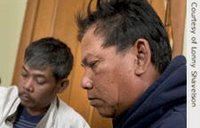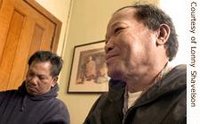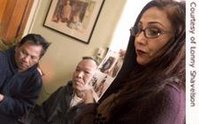Lonny Shavelson
Voice of America
California
07/12/2006
From 1975 to 1979, two million Cambodians were murdered by the Khmer Rouge in the killing fields. Thirty years later, a major medical study in the U.S. finds that two thirds of the 150,000 Cambodian refugees here still suffer from the disabling flashbacks, nightmares and depression of post-traumatic stress disorder. Now, in California’s Bay Area, dozens of Cambodians face a new challenge. The Social Security Administration is investigating them, for fraud.
Souphan is 55. Though she left Cambodia 26 years ago, she still has nightmares of the killing fields. Sitting in her small kitchen in Oakland, she says that after her parents and three siblings died in Khmer Rouge prison camps, she fled to the Thailand border.
Souphan: "I ran with my child. Run, run. And then I accidentally dropped my child’s hands. And they shot my child. And my child died."
Another daughter starved to death in the refugee camp. Psychologist Mona Afary first heard Souphan’s story two years ago.
Dr. Afary: "She basically could not carry a conversation without crying. It was just the look of someone who is in grief, deep grief. So, definitely this woman needed treatment, and she had needed it for many, many years."
Dr. Afary directs a non-profit clinic in Oakland for refugees. She specializes in post-traumatic stress disorder. Known for afflicting Vietnam war veterans, PTSD can strike anyone after life-threatening events. Without therapy, the psychic damage can last for years. Afary says that’s the case for her Cambodian patients.
Dr. Afary: "None of the Cambodians had received medical treatment before, and it was like they had a scream inside them that had never come out. It seemed as if they were frozen in their traumatized state."
Souphan came to see her after she’d lost many jobs. She said she was seeing images of her dead daughters and would weep uncontrollably at work.
Souphan: "I don’t know what kind of work to do. I don’t have enough money to pay the bills."

Afary sent a psychological evaluation to Social Security. She said Souphan couldn’t work because of depression and PTSD, and would need disability benefits while in therapy.
In the past two years, Afary sent similar assessments for dozens of Cambodians. Jonathan Lasher is a legal advisor with the investigative branch of Social Security. He agreed to be interviewed only off tape. Lasher says so many similar diagnoses from the same psychologist typically lead to an investigation.
Souphan: "They rang my doorbell. One woman and one man. They asked to see my medicines."
Social Security opened investigations on at least twenty Cambodians, who say investigators trailed them in the streets, to supermarkets, to doctors appointments. Souphan says in Cambodia, such actions were followed by imprisonment, and death. Souphan is actually not her name – she asked it be changed because she now fears the U.S. government.
Souphan: "I was scared. I didn’t know what they had come for."
Investigators gave Souphan a standard test of mental function. They asked how apples and oranges are similar. She said she didn’t know. The investigator wrote in his report, “…incorrect responses to such basic questions are often associated with malingering.” In other words, she was faking it.
Social security denied Souphan’s disability benefits. Dr. Afary says she understands that social security needed to check out the Cambodians’ claims. But, she says, for the Cambodians, Social Security’s style of investigation is psychological torture.
Dr. Afary: "Since these investigations started, all the symptoms came back. Nightmares, flashbacks, panic attacks. Their homes don’t feel safe anymore."
 Lawyers have met twice with Social Security to ask that they stop the investigations or require investigators to change their techniques. Stephen Weiss represents fifteen Cambodians under investigation.
Lawyers have met twice with Social Security to ask that they stop the investigations or require investigators to change their techniques. Stephen Weiss represents fifteen Cambodians under investigation.
Stephen Weiss: "The investigations are being done despite the fact that there is substantial documentation of their condition, despite their community and personal history."
But David Butler, a supervisor in the investigative branch in Los Angeles, says they don’t change the style of their investigations to accommodate the mental health needs of refugees.
David Butler: "We’re not psychiatrists and we’re not medical doctors. We’re federal investigators. So, when you get a fraud investigation, you look at everything and you go where it takes you."
Social Security’s western public affairs officer Leslie Walker would only comment off tape. She said they constantly work with their staff to be culturally sensitive. But they have to forward suspicious cases to the independent investigative branch. Said Walker, “We can’t influence what they do.” The Cambodian’s lawyers say the investigations led to a denial of benefits in all twenty cases.
Seven have been overturned by appeals judges, who granted benefits. Thirteen appeals, including Souphan’s are pending. And, social security continues to open new investigations of Cambodians, with no change in methods. Dr. Afary says Souphan, after making progress in therapy, is again overwhelmed by fear.
Souphan is 55. Though she left Cambodia 26 years ago, she still has nightmares of the killing fields. Sitting in her small kitchen in Oakland, she says that after her parents and three siblings died in Khmer Rouge prison camps, she fled to the Thailand border.
Souphan: "I ran with my child. Run, run. And then I accidentally dropped my child’s hands. And they shot my child. And my child died."
Another daughter starved to death in the refugee camp. Psychologist Mona Afary first heard Souphan’s story two years ago.
Dr. Afary: "She basically could not carry a conversation without crying. It was just the look of someone who is in grief, deep grief. So, definitely this woman needed treatment, and she had needed it for many, many years."
Dr. Afary directs a non-profit clinic in Oakland for refugees. She specializes in post-traumatic stress disorder. Known for afflicting Vietnam war veterans, PTSD can strike anyone after life-threatening events. Without therapy, the psychic damage can last for years. Afary says that’s the case for her Cambodian patients.
Dr. Afary: "None of the Cambodians had received medical treatment before, and it was like they had a scream inside them that had never come out. It seemed as if they were frozen in their traumatized state."
Souphan came to see her after she’d lost many jobs. She said she was seeing images of her dead daughters and would weep uncontrollably at work.
Souphan: "I don’t know what kind of work to do. I don’t have enough money to pay the bills."

Afary sent a psychological evaluation to Social Security. She said Souphan couldn’t work because of depression and PTSD, and would need disability benefits while in therapy.
In the past two years, Afary sent similar assessments for dozens of Cambodians. Jonathan Lasher is a legal advisor with the investigative branch of Social Security. He agreed to be interviewed only off tape. Lasher says so many similar diagnoses from the same psychologist typically lead to an investigation.
Souphan: "They rang my doorbell. One woman and one man. They asked to see my medicines."
Social Security opened investigations on at least twenty Cambodians, who say investigators trailed them in the streets, to supermarkets, to doctors appointments. Souphan says in Cambodia, such actions were followed by imprisonment, and death. Souphan is actually not her name – she asked it be changed because she now fears the U.S. government.
Souphan: "I was scared. I didn’t know what they had come for."
Investigators gave Souphan a standard test of mental function. They asked how apples and oranges are similar. She said she didn’t know. The investigator wrote in his report, “…incorrect responses to such basic questions are often associated with malingering.” In other words, she was faking it.
Social security denied Souphan’s disability benefits. Dr. Afary says she understands that social security needed to check out the Cambodians’ claims. But, she says, for the Cambodians, Social Security’s style of investigation is psychological torture.
Dr. Afary: "Since these investigations started, all the symptoms came back. Nightmares, flashbacks, panic attacks. Their homes don’t feel safe anymore."
 Lawyers have met twice with Social Security to ask that they stop the investigations or require investigators to change their techniques. Stephen Weiss represents fifteen Cambodians under investigation.
Lawyers have met twice with Social Security to ask that they stop the investigations or require investigators to change their techniques. Stephen Weiss represents fifteen Cambodians under investigation.Stephen Weiss: "The investigations are being done despite the fact that there is substantial documentation of their condition, despite their community and personal history."
But David Butler, a supervisor in the investigative branch in Los Angeles, says they don’t change the style of their investigations to accommodate the mental health needs of refugees.
David Butler: "We’re not psychiatrists and we’re not medical doctors. We’re federal investigators. So, when you get a fraud investigation, you look at everything and you go where it takes you."
Social Security’s western public affairs officer Leslie Walker would only comment off tape. She said they constantly work with their staff to be culturally sensitive. But they have to forward suspicious cases to the independent investigative branch. Said Walker, “We can’t influence what they do.” The Cambodian’s lawyers say the investigations led to a denial of benefits in all twenty cases.
Seven have been overturned by appeals judges, who granted benefits. Thirteen appeals, including Souphan’s are pending. And, social security continues to open new investigations of Cambodians, with no change in methods. Dr. Afary says Souphan, after making progress in therapy, is again overwhelmed by fear.


























9 comments:
Too good to be true. some years ago I felt sympathy for the Cambodian young lady and middle age man abnd thought they were having PTSD. They looked just like they were, truely saying. I decided to put my effort to help them to get Social Security benefit since they could not work becaue of the constant nightmares they were experienced.
Man oh man! 6 months down the road, right after they got the benefit, I was glad to hear they both work again but getting pay in cash, so they don't need to report of their income, sic. Cambodian people are smart and dishonest. Next time, I promised myself to hit the dust road until the cow saying MOW.
the no.1 comment was mostly true...if you are not disable 100 percent you should keep the fund for the one who really needed...not work for cash and also collect welfare or ssi and drive mercedez....we are now american should stand up and report all those corrupted person to the gov ...don't let them corrupted as most gov in cambodia..
we hate corruption why should we support all those wrongdoing person
even the gov not know...but god know...if you act as "chorrr"why "thoeu bon"....
The mental illness is the most complicated and expensive to treat than any other illness! It is because it is in the brain and people can't see, can't touch, can't smell, and so can't be treat!
Alot of homeless people have some form of mental illness! There had been some researchs suggested that people who are an alcoholic have some form of mental illness!
I mean if people don't have mental illness and why would continue to display a very destructive behavior? Oh well, until one day when these people start killing themselves and start carrying a gun into public places and start spraying bullets killing alot of innocence and only then people will admit that it is a mental illness or some shit!
Please have pity to Cambodian refugees. No human being can actually evaluate the post trauma of the Killing fields. I am personnally OK, work and pay taxes but once in a while I still have flash back nightmare from the Killing fields. If you are not in the situation you really don't know how bad it is.
What you gonna do with all the people that get cut off from SSI. Send them to work, to the street or back to Cambodia. With help cut off, they will be depressed and their trauma will be worse.
It's ridiculous. The Killing fields is the side effects of US policy in Indochina. Cambodians are the victims. Now they will be victims again. It's double jeopedies.
Think about that and think twice.
This is not corruption like the gentlemen above said, it's survival.
Thank you for your time.
The view of the American case workers including doctors and psychiatrists at that time was exactly that - those khmer refugees are mentally ill thus needing help and assistance. If one were to politicize it otherwise, well, those khmers really do need more help and assistance whether it be legal or otherwise...good luck to all of them.
Lets be real.. and honest...its hard to keep a secret in a cambodian community when everyone either know someone or of someone..
who fake their illness. Or is on the system and recieving SSI, Welfare,WIC AND drives a Lexus and owns a donut store. Some have even gone back to Cambodia to live, while their children send them money.
Do you know where this money comes from? Do you have any idea what damage it could do to cambodian community? and the stereotype that goes with it? Its hard enough trying to assimilate two culture, much less having the reputation that Cambodians are also corrupt in the U.S.
We have enough corruption in Cambodia, set a good example outside of Cambodia.
To 7:22AM
Come on man! Do you really think that all Cambodian are like that!
I dare to challenge you to show me the percentage of all Cambodian people on SSI, Welfare, amd WIC and driving Lexus comparing to other race!
Tell me what year is the Lexus! ahahahah!
Not every Cambodian in America are on welfare or on ssi. Many are hard working "Americans". In the Cambodian community in Lowell, Mass; businesses are booming. Those who are smart enough to invest are making hundreds of thousands of dollars. Pailin Plaza, a store/club/buiding in downtown Lowell is making possibly millions in businesses.
Like any other group, those who are smart enough to invest will make it big, and those who live paycheck by paycheck have to be smart and save.
In America, anyone with ideas and hard work can succeed. I am not saying that there are dishonest people, as there are in any ethnic group, but overall, Cambodians are hard working people.
Amen to 1:26pm!
Post a Comment